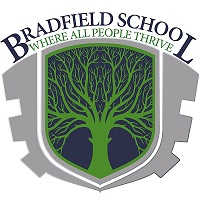Curriculum Matters

"The curriculum is a never-ending story." Mary Myatt
Curriculum is what we teach to our students. A good curriculum though is so much more than a set of knowledge that educators feel students should learn from a range of subjects. It has to be carefully planned, sequenced, evolve over time and meet the needs of ALL students. We refer to this as schema; the interconnected web of knowledge that we develop over time.
At Bradfield, staff have been working hard to develop the curriculum in its three areas of intent, implementation and impact to ensure all students can thrive and achieve their potential.
Below is a summary of some of things we have been working on since September and how you can support your child in successfully accessing the curriculum we offer. The examples used are just a snapshot of the myriad of work that is happening across school.
Curriculum Intent
A curriculum intent is an ethos; it encapsulates the overall aim we have for every student we teach in specific subject areas. Put simply, it is the why behind what we want students to know. Curriculum in every subject area at Bradfield is planned under an individual intent developed collaboratively within departments. Everything students learn within each department will be working towards achieving this. Individual intent statements along with curriculum maps (what will be taught and when) for subject areas can be found on the Bradfield School website curriculum area here. You will also see that some of these pages have resources to support the curriculum, something that we will be adding to continually as we evolve and develop what we are delivering.
Curriculum Implementation and Impact
It is difficult to separate these two parts of curriculum design because one influences the other. It is what happens in the classroom… It is what we teach, how teachers ensure all students access and develop the knowledge important to each subject area, and how we then work to close any gaps that have been identified in learning.
Staff in all departments have been working on developing their curriculum to be modern, relevant and to include teaching methods to engage and enthuse. For example, English have been working on updating some of the texts to include more diversity to reflect modern British society and History are aiming to ‘decolonise’ their curriculum for the same reasons. To support students in better accessing work in these subject areas, staff are starting to introduce reciprocal reading strategies to develop literacy skills and encourage students to make more detailed connections between knowledge.
Measuring impact takes place through assessments, but this isn’t always through tests completed in silence. Staff are routinely using frequent ‘low stakes’ methods such as quizzing and mini whiteboard work to understand how well students have understood new learning. The maths department have started to use many more low stakes assessments to allow staff to spot gaps in student understanding more frequently. This is working to boost student confidence with more formal assessments.
What further support can my child access?
We are in the process of further developing our school’s website and internal SharePoint area to provide resources that complement the curriculum and can be used at home to support homework, revision and consolidation. The Geography page of the website has a link to the department’s SharePoint, which has a page for each year group and then each unit of work. These resources can be used to extend understanding, revise content and complete learning journals for each unit of work at key stage 3 (this is set as homework after every lesson). Knowledge organisers for English Y7, 8 and 9 units of work are now available on SharePoint* via the website (click the down arrow next to ‘Key Stage 3 Curriculum Content’). This will be extended to other units of work in time.
*To access SharePoint from home, your child will be prompted to log in on clicking a link. The username and password are the same as those used in school.
What can you do to support your child?
Engage in conversation about what they have learnt at school. Ask questions. Let your child tell you about what they have enjoyed or where they need more help. Where you feel unable to offer extra support, please look to use some of the resources we are making available through the website; we are adding more each week. Also encourage your child to speak to their teacher when they haven’t understood, this helps us to know what else we can do to continually improve the work we are doing.
Gemma Bott,
Assistant Head – Curriculum and Systems.
